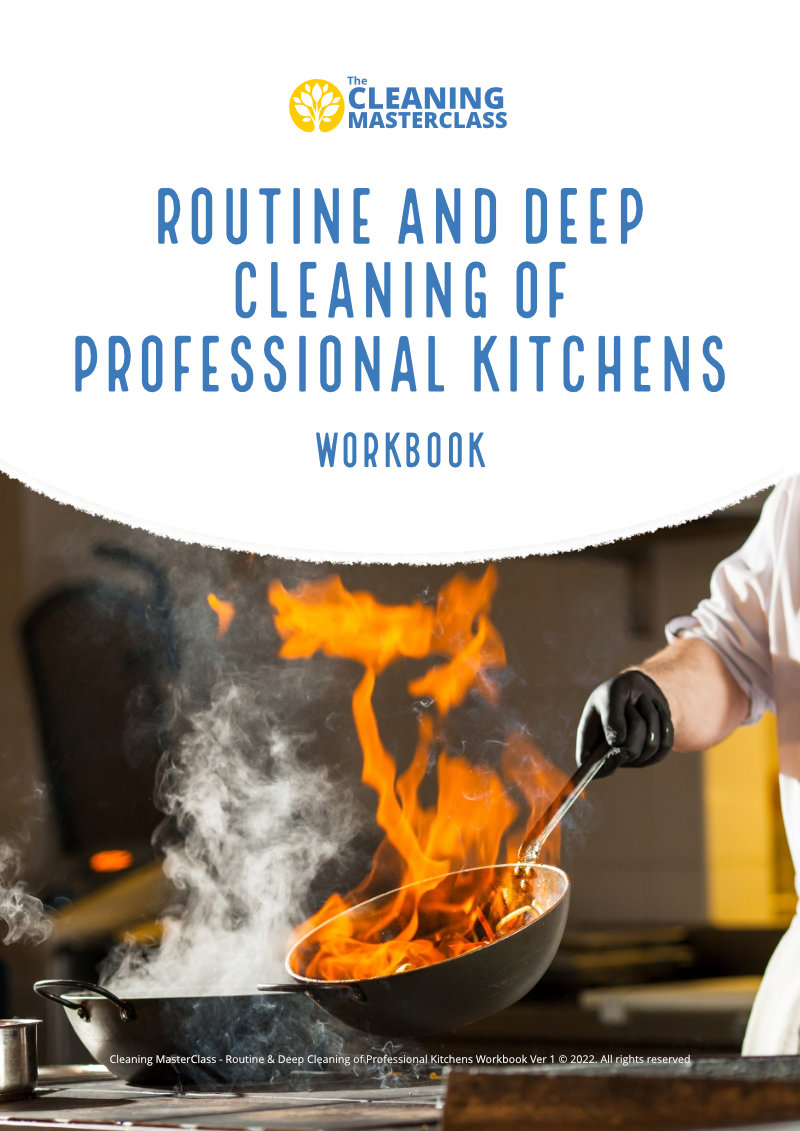
26 Jun Training in Routine and Deep Cleaning of Professional and Commercial Kitchens
Course Overview
The Commercial Kitchen Cleaning training course is designed to provide participants with the necessary knowledge and skills to maintain a clean, hygienic, and safe environment in a commercial kitchen setting. This comprehensive course covers essential cleaning and disinfection techniques, proper handling of cleaning chemicals and equipment, and best practices for maintaining hygiene, preventing cross-contamination, and complying with food safety and hygiene regulations. Whether you are a kitchen manager, owner, cooks, kitchen staff or professional cleaners, this course aims to equip you with the knowledge and insights to effectively plan and execute routine and deep cleaning sessions in any commercial kitchen, ensuring food safety and a positive dining experience for customers.
Introduction to Commercial Kitchen Cleaning
Maintaining a clean and hygienic environment is of utmost importance in a commercial kitchen. A clean kitchen not only ensures food safety but also promotes efficient operations and creates a positive image for the establishment. Commercial kitchen cleaning involves a systematic and thorough approach to removing dirt, grease, and contaminants from surfaces, equipment, and utensils. It requires adherence to specific guidelines and practices to meet the stringent standards set by food safety regulations.
The cleaning process in a commercial kitchen goes beyond the routine wiping of counters and sweeping of floors. It involves a comprehensive understanding of different areas, equipment, and their specific cleaning requirements. Proper cleaning procedures and the use of appropriate cleaning agents are essential to eliminate harmful bacteria, prevent cross-contamination, and maintain a safe and healthy environment for both staff and customers.
Commercial kitchen cleaning encompasses various aspects, including the cleaning of food preparation areas, cooking equipment, ventilation systems, refrigeration units, and storage areas. It also involves attention to details such as the proper sanitation of utensils, cutting boards, and other tools used in food preparation. Regular cleaning schedules and meticulous record-keeping play a crucial role in ensuring that cleaning tasks are carried out consistently and thoroughly.
By adhering to the highest standards of cleanliness, commercial kitchens can not only comply with food safety regulations but also enhance their reputation and customer satisfaction. A clean and well-maintained kitchen reflects professionalism, care, and dedication to delivering safe and high-quality food.
Remember, cleanliness is not just a one-time task but an ongoing commitment. Regular cleaning and diligent maintenance are key to ensuring the long-term success of any commercial kitchen.
Introduction to Commercial Kitchen Deep Cleaning
In a bustling commercial kitchen, regular cleaning routines may not always suffice to maintain optimal cleanliness and hygiene. That’s where commercial kitchen deep cleaning comes into play. Deep cleaning goes beyond the surface-level cleaning tasks and focuses on the thorough cleaning and sanitisation of hard-to-reach areas, equipment, and fixtures. It is an intensive process that aims to eliminate accumulated dirt, grease, and bacteria, ensuring a pristine and safe environment for food preparation.
Deep cleaning is typically conducted on a periodic basis, complementing the daily cleaning practices. It involves a systematic and meticulous approach to tackle areas that are often overlooked during routine cleaning, such as behind appliances, inside exhaust hoods, or within the intricate components of equipment. By addressing these hidden areas, deep cleaning helps prevent the buildup of contaminants that can compromise food safety and quality.
A professionally conducted deep cleaning session in a commercial kitchen requires specialised knowledge, expertise, and appropriate cleaning products. Trained professionals understand the nuances of different surfaces, equipment, and materials, employing industry-approved techniques to achieve thorough cleanliness. They possess the necessary tools and equipment to effectively remove stubborn grime, sanitise surfaces, and restore the kitchen to its optimal condition.
The benefits of commercial kitchen deep cleaning are multifold. Firstly, it helps prevent the growth and spread of harmful bacteria, reducing the risk of foodborne illnesses and ensuring compliance with food safety regulations. Secondly, deep cleaning enhances the lifespan and performance of kitchen equipment by removing grease and debris that can cause malfunction or deterioration. It also improves the overall kitchen ambiance, making it a more pleasant and inviting space for both staff and customers.
It is important to note that deep cleaning should be carried out by trained professionals who are knowledgeable about the specific requirements of commercial kitchens. These professionals follow strict protocols, utilise appropriate cleaning agents, and adhere to safety standards to minimise any disruptions to kitchen operations.
Remember, deep cleaning is an investment in the long-term success of your commercial kitchen. By prioritising deep cleaning alongside regular cleaning routines, you can create a safer, more efficient, and more hygienic environment that upholds the highest standards of food safety and customer satisfaction.

